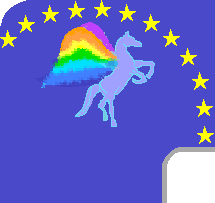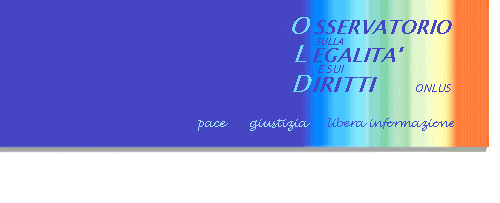

Liberta'
di stampa : Freedom House declassa l'Italia
a cura di red
Nel 2005 L'Italia e' al 77° posto nella classifica di Fredoom House per la liberta' di stampa. Il passaggio da FREE a PARTLY FREE avviene nel 2004. Nel 2003 l'Italia era al 53° posto. Nel 2004 l'Italia scendeva al 74° (le motivazioni di seguito).
FREEDOM OF THE PRESS 2004 - A Global Survey of Media Independence
Country Reports
and Ratings:
Italy Status: Partly Free
Legal environment: 11
Political environment: 13
Economic environment: 9
Total Score: 33
Status change explanation: Italy's rating moved downward from Free to Partly Free as a result of high media concentration and increased political pressures on media outlets. The country's free and independent media institutions are threatened by government interference and the highest level of media concentration in Europe.
This trend is the result of 20 years of political administrations that have failed to reform the framework for independent journalism and access to information. In 2003, in response to calls for reform, legislators introduced the controversial so-called Gasparri law, which would have allowed increased cross-ownership of broadcast and print media.
Critics asserted, however, that the bill was tailor-made to circumvent a court decision unfavorable to Prime Minister Silvio Berlusconi's media empire, reversing a ruling that would have forced Berlusconi's company to convert its station, Rete 4, to less profitable satellite television. The bill was approved by parliament but vetoed by President Carlo Ciampi in December.
In response, Berlusconi signed a decree allowing Rete 4 to continue terrestrial broadcasting until April 2004. There have been increasing claims of government interference in reporting. For example, some journalists complained that coverage of Berlusconi?s controversial comments to the European Parliament in July had been deliberately 'softened and cut.'
The editor of Corriere della Sera, the major daily, resigned in May amid allegations that he was pressured to quit due to his tense relations with government officials. A journalist in Sicily was attacked by unidentified men in August after publishing articles about local drug trafficking, and shots were fired at the home of a journalist in Sardinia who also appeared to be targeted because of his work.
Berlusconi's substantial family business holdings control the three largest private television stations and one newspaper, as well as a significant portion of the advertising market. As prime minister, he is able to exert influence over public service broadcaster RAI as well, a conflict of interest that is one of the greatest in the world. However, the concentration is considerably less in the print media, which continue to be critical of the government.
***
FREEDOM OF THE PRESS 2005 - DRAFT COUNTRY REPORTS COUNTRY REPORTS AND RATINGS Draft 27 April 2005
Italy Status:
Partly Free
Legal Environment: 9
Political Environment: 13
Economic Environment: 13
Total Score: 35
Freedom of speech and the press are constitutionally guaranteed. Legislators moved in July towards abolishing prison sentences for libel, a move welcomed by media organizations, but the proposed amendments have yet to be adopted. Politicians and their allies filed several libel suits against journalists this year. In February, journalist Massimiliano Melilli was sentenced to 18 months in prison and ordered to pay 100,000 euro (US$ 124,400).
In July, a 76-year-old journalist and senator was placed under house arrest, relaxing his 2002 sentence of 29 months? imprisonment for libel. Press freedom organizations criticized two separate government raids on journalists' homes and offices, due to the journalists? refusal to reveal their sources for controversial, investigative reports. Most press outlets are privately owned, but are often linked to political parties or run by large media conglomerates that exercise some editorial influence.
In December, journalists at Italy's leading and highest-selling daily Corriere Della Sera protested increasing editorial interference and pressure in the newsroom from its shareholders. The newspaper is owned by RCS Mediagroup, in which 15 of Italy's major conglomerates have a stake. Concerns about the concentration of media ownership have been an issue since the election in 2001 of Silvio Berlusconi, a media magnate and Italy's wealthiest individual, as prime minister.
The print media, which consist of 8 national newspapers, two of which are controlled by the Berlusconi family, continue to provide diverse political opinions, including those critical of the government. However, Berlusconi controls or influences six of the seven national broadcast channels. Mediaset, a company in which he has a major interest and the largest private broadcaster in the country, owns three national channels, while the state-owned network (RAI), traditionally subject to political pressure, controls three.
Questions continue to be raised about the political impact of Berlusconi's control of the media. The Osservatorio di Pavia, an independent media watchdog, reported that in the month of February, Berlusconi's presence on television accounted for 42 percent of the time dedicated to politicians.
During the year, the head of RAI, Lucia Annunziata, and one of its star television broadcasters, Lili Gruber, quit in reaction to Berlusconi's domination of the media. A long awaited conflict of interest bill, which was intended to resolve the contradictions between Berlusconi's private business and his role as prime minister, was passed in July. Although the bill limits the managing control a politician has over his/her holdings, it does not bar them from owning companies. As a result, the bill, which was criticized as being toothless by critics, will have little impact on Berlusconi's media empire.
In April, the Senate adopted a law on broadcasting reform, known as the Gasparri law, which ostensibly introduces a number of reforms, such as the switchover to digital broadcasting (due to take place in 2006) and the partial privatization of RAI. The law was initially vetoed in December 2003 by President Ciampi, who was urged to do so by media organizations claiming the law threatened press freedom and because it undermined news pluralism.
Although the revised law has a clause that limits the maximum revenue that a single media company can earn, it excludes interests in publishing, cinema and the music industry. Critics of the law still say that it reinforces Berlusconi's power over the media.
The new law also allows one of the three Mediaset channels, Retequattro, to continue terrestrial broadcasting. The decree runs contrary to a 2002 constitutional court ruling that demanded the channel switch to satellite by January 2004 to ensure competition. The shift to satellite would have led to a considerable loss in the station's market value.
by www.osservatoriosullalegalita.org
___________
I CONTENUTI DEL SITO POSSONO ESSERE PRELEVATI CITANDO E LINKANDO LA FONTE